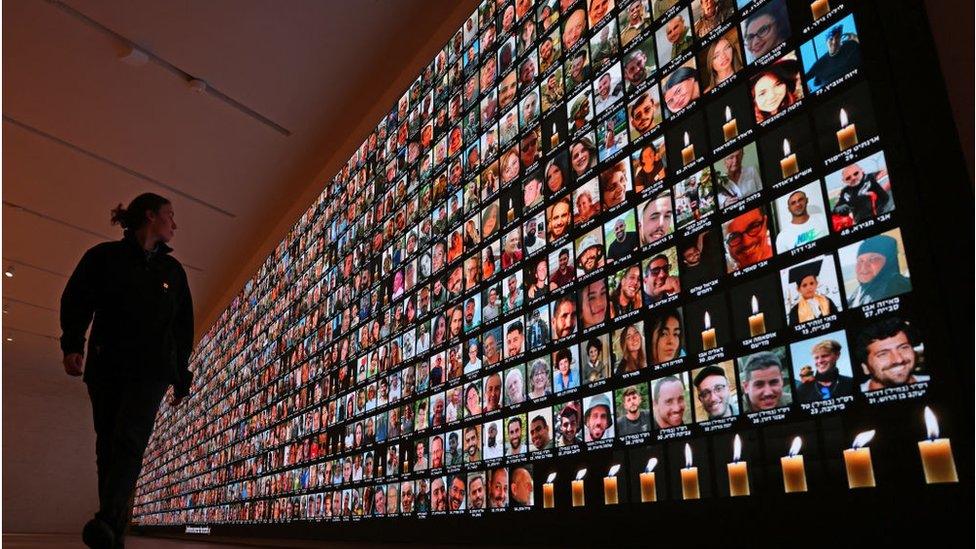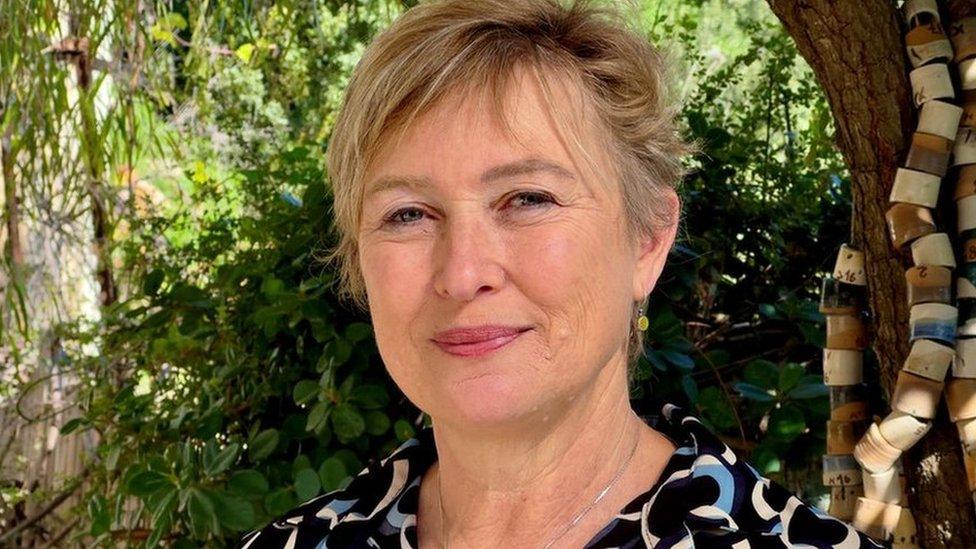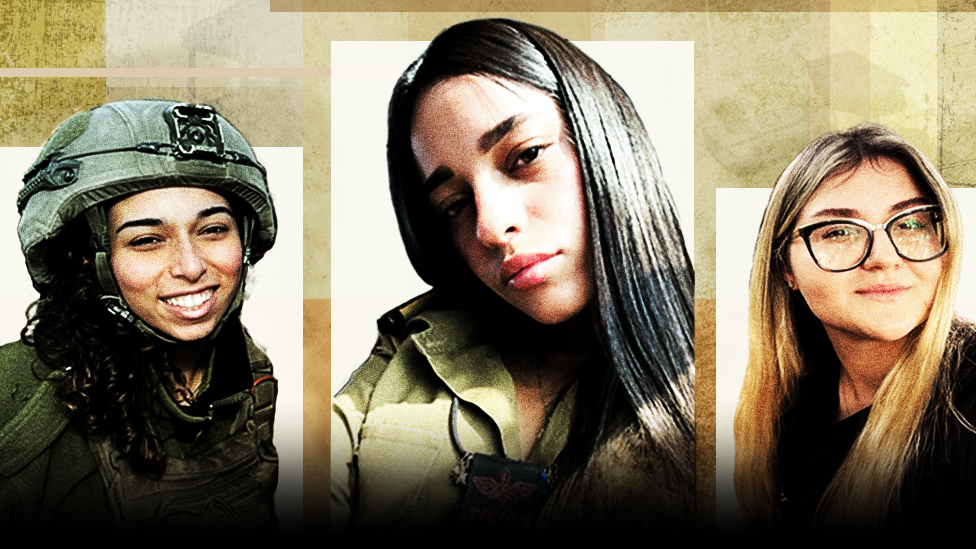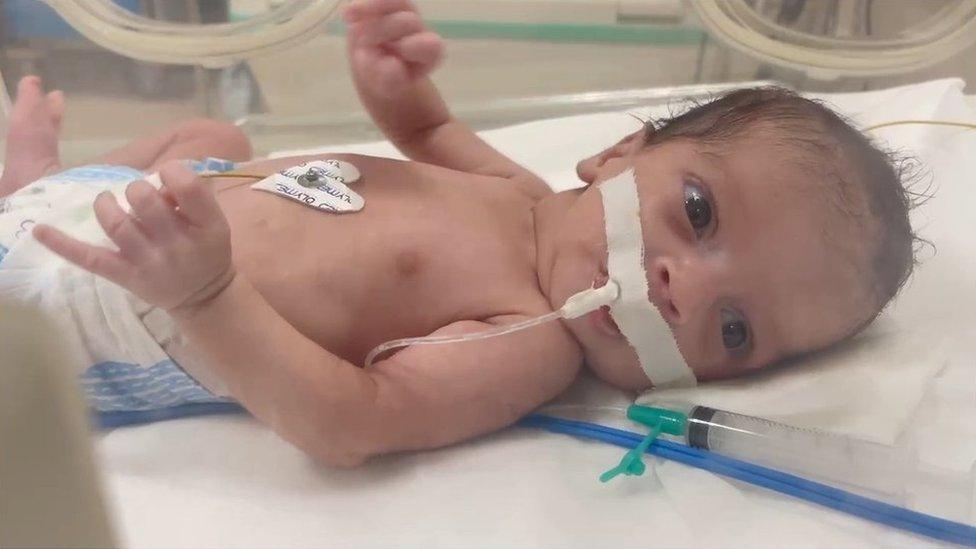Israelis tell British MPs of evidence of Hamas sexual violence
- Published

Portraits of Israelis killed on 7 October, on display at the National Library in Jerusalem
Israelis who dealt with the bodies of victims of Hamas's 7 October attacks on Israel have told British MPs and peers that there was "deliberate, systematic genital mutilation" of female victims and that there was "no question" that some had been sexually assaulted.
Business Secretary and Minister for Women Kemi Badenoch said all the reports must be fully investigated and sexual violence must be condemned. "Rape is not resistance," she stated.
Hamas has denied its gunmen sexually assaulted women during the attacks.
But a senior Israeli police officer said her force had "clear evidence" that rape and other acts of sexual violence had been committed on a scale large enough to define it as a crime against humanity.
Warning: Readers may find some of the details below distressing.
On 7 October, hundreds of Palestinian gunmen from Gaza infiltrated southern Israel, where they killed around 1,200 people - mostly civilians - and took 250 others hostage.
Israel responded by launching a military campaign in Gaza, during which more than 26,900 people - most of them women and children - have been killed, according to the Hamas-run health ministry.
Many of the MPs and members of the House of Lords who attended Wednesday's meeting in Parliament were in tears as they listened to the testimony of the Israelis.
Shari Mendes, an architect, was called up as a reservist by the Israeli military to help medics identify female bodies brought to the Shura army base after 7 October.
"Many women arrived with bloody, shredded underwear, many arrived with no clothing," she said.
"Our team commander saw several female soldiers who were shot in the vagina, the crotch or they were shot in the breast. This was gratuitous. This was a deliberate, systematic, genital mutilation."
Ms Mendes said her identification unit had seen bodies decapitated or with limbs cut off. "I'm here to be their voice," she said.
Simcha Greiniman was a volunteer for Zaka, an Israeli religious organisation that collects remains of the dead for burial.
He told the BBC he had recovered many bodies after the Hamas attack.
"In one of the houses there was a woman separated from her family. She was in her bedroom leaning on her bed," he recalled.
"She was half naked from the waist down. She was shot in the back of her head... She had a live grenade in her hand."
He described finding another woman who had "nails and different objects in her body, in women's personal places", adding: "It's something you can't imagine."
Mr Greiniman was clear that some of the victims he had seen had been sexually attacked.
"For sure, for sure, there's no question," he said. "I'm the person that dealt with it. I'm the eyes."
"I'm here to say, 'Yes, this is what happened,' and to show the world. We are telling the truth and the world has to understand and do something with it."
His plea to the international community was to understand that it had happened and not push it away, and to put those in charge behind bars. "They have to pay for what they did," he said.
Neither Ms Mendes nor Mr Greiniman are experts on sexual violence, but their testimony is in line with the evidence that the Israeli government says has been collected from forensic investigations as well as from hundreds of statements by witnesses and first responders.
Chief Superintendent Mirit Ben Mayor of the Israel Police told the Parliamentarians that it had not been easy to collect evidence because of the many different locations and because people had been murdered.
But she said: "There is clear evidence that rape and sexual violence offences were committed against the victims. We are investigating crimes against humanity."
The BBC has also seen and heard evidence that women were raped and mutilated. It includes video testimony from an eyewitness at the Nova music festival, videos of naked and bloodied women filmed by Hamas gunmen, and photographs of bodies taken at the scenes of a number of attacks.
The cousin of 19-year-old female hostage Agam Berger told the meeting that they had to bring home the more than 100 Israelis and foreign nationals believed to still be held captive in Gaza.
Ashley Waxman Bakshi said she did not even know if her cousin wanted to stay alive after being held for so long.
"You can clearly understand our worry with every minute that passes when our women and girls are in the hands of these monsters, if they were able to do this in eight hours or 12 hours on 7 October," she said. "They have been there for 117 days. What if they are pregnant?"
Kemi Badenoch said the UK stood in solidarity with all the victims. She also called on international organisations to do more to be clear in their condemnation of sexual violence against Israelis, saying there must not be double standards.
Israeli officials and activists have complained that leaders of the UN and other international organisations have been slow to respond to the allegations.
On Monday, the UN Special Representative on Sexual Violence in Conflict, Pramila Patten, arrived in Israel on a visit to "give voice to survivors, witnesses, recently released hostages and those affected; to identify avenues for support, including justice and accountability; and to gather, analyse and verify information".
In a message to victims, their families and witnesses published by the Israeli presidency, Ms Patten said: "Please come forward, please break your silence, because your silence will be the licence of those perpetrators."
"We really want to ensure that [victims] have justice so that we put an end to this heinous act," she added.
Two UN human rights experts said earlier this month that the reported acts of sexual violence constituted "gross violations of international law, external, amounting to war crimes which, given the number of victims and the extensive premeditation and planning of the attacks, may also qualify as crimes against humanity".
Correction 13th February: This article wrongly reported that about 1,300 people had been killed following the 7th October attack by Hamas. This was based on counting those who later died from their injuries in addition to the figure of more than 1,200. The article has been amended to now refer to about 1,200 deaths, a figure which includes those deaths and which Israel says is not final.
- Published16 January 2024

- Published15 January 2024

- Published31 January 2024
